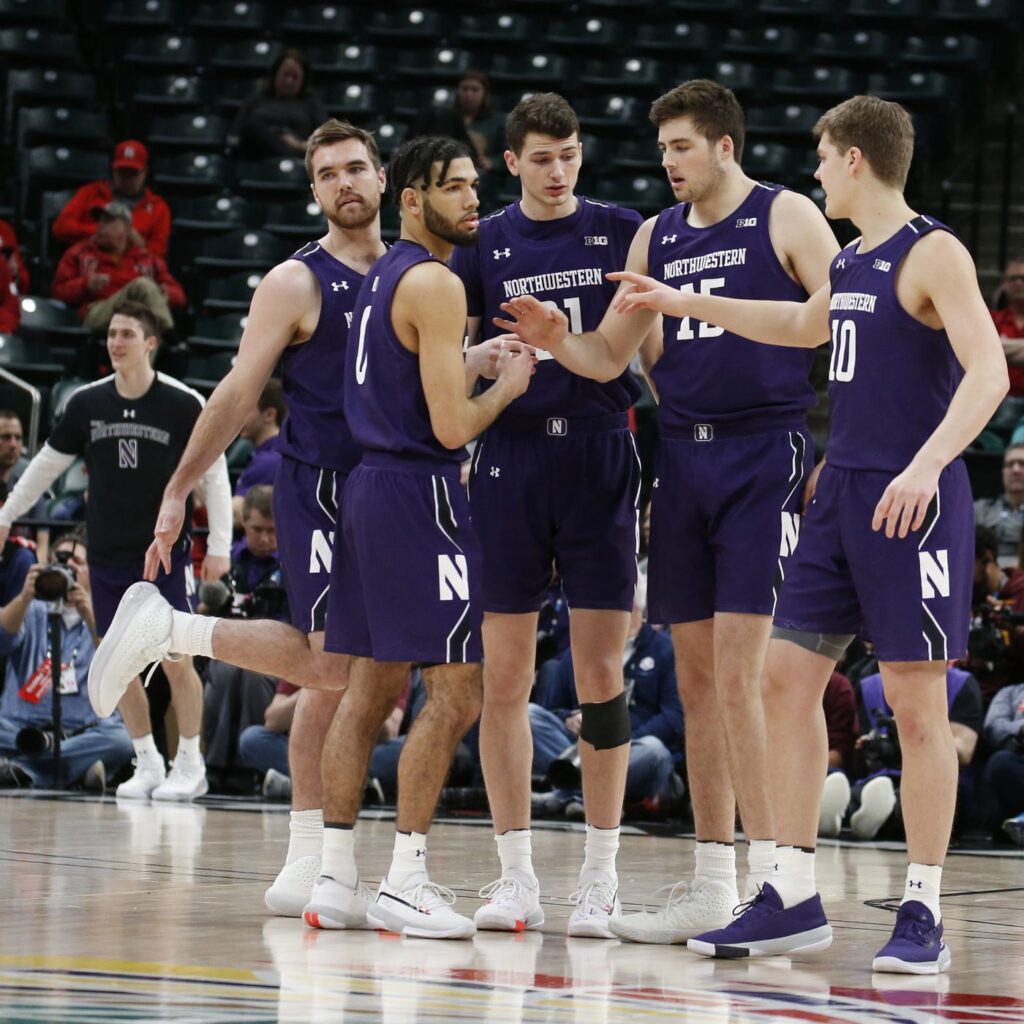Team History
The Northwestern Wildcats men’s basketball program boasts a rich legacy spanning over a century. The team’s roots date back to the early 1900s, and over the decades it has witnessed periods of both success and struggle. The Wildcats have carved a unique place in college basketball history, including their well-known distinction of being the only longstanding Power Five conference team to have never made the NCAA Tournament – a streak finally broken in 2017 with a celebrated appearance.
Despite facing challenges throughout the years, the Northwestern Wildcats have demonstrated unwavering determination and resilience. Their story represents the enduring spirit of college athletics, where even programs with fewer traditional resources can strive for greatness and achieve those once-elusive dreams. This persistence and ability to persevere amidst adversity are integral components of the Northwestern Wildcats’ identity.
Foundation and Early Years
The seeds of the Northwestern Wildcats basketball program were planted in 1901. In those early years, competition was fierce, with rivalries against other Chicago-area schools forming the cornerstone of their schedule. The Wildcats embraced the challenge, honing their skills in these close-quarters clashes. The geographic proximity of their rivals fueled an intensity that pushed the program to grow and improve.
As the sport of basketball evolved, so too did the Northwestern Wildcats. They transitioned from the less structured style of the early 1900s to a more organized and tactical approach as the decades progressed. The team’s dedication and adaptability foreshadowed its ability to weather the changing tides of college basketball, a testament to their early focus on developing a versatile and adaptable approach to the sport.
Notable Early Achievements
Despite operating in a basketball landscape dominated by larger programs, the Wildcats etched their mark in history. The 1931 and 1933 seasons saw them capture Big Ten Conference championships, establishing their early reputation as a force to be reckoned with. These triumphs not only showcased the program’s potential but also galvanized their fanbase, igniting a sense of what was possible for Northwestern basketball.
Individual players also shone brightly in the Northwestern annals. John Wooden, a name synonymous with basketball greatness, graced the Wildcats’ roster in the 1930s. His impact and legacy would extend far beyond his playing days at Northwestern, hinting at the future talent the program could cultivate and the broader impact its members could have on the sport of basketball.
Periods of Change
The Northwestern Wildcats, like most college basketball programs, have navigated eras defined by both ups and downs. The period following their early Big Ten championships saw a decline in success, though the team remained a competitive presence. Challenges were amplified by the increasing parity and rising standards in college basketball, requiring continuous internal evolution to remain competitive.
During these ebbs and flows, the program underwent changes with various leadership transitions and shifts in conference affiliation. Even with setbacks, unwavering support within the Northwestern community kept their competitive spirit alive. This support proved vital throughout the decades, nurturing a loyal fanbase and demonstrating the belief that the Wildcats could once again ascend to the top of college basketball.
Championships and Achievements
While the elusive NCAA Tournament appearance remained out of reach for decades, the Northwestern Wildcats added to their trophy case. Their Big Ten Conference championships in 1931 and 1933 are sources of immense pride. In 2017, the Wildcats finally shattered their NCAA Tournament drought, making history and electrifying their loyal fanbase. In 2023, the team achieved its highest conference finish since 1959, showing continued improvement and hinting at future possibilities.
Beyond conference titles, Northwestern players have earned individual distinction. From All-Conference honors to the program’s NBA draft representation, the Wildcats have consistently produced high-caliber talent. These individual achievements underscore the quality of the program and highlight the Wildcats’ ability to develop star athletes ready for the highest levels of basketball.
Management and Coaching Staff
The Wildcats are led by head coach Chris Collins, son of basketball legend Doug Collins and a former standout player for Duke University. Collins brings a wealth of knowledge and experience to the program, embodying the passion and dedication the team is known for. He’s assisted by a skilled coaching staff composed of individuals with diverse expertise who provide crucial support for player development and strategy.
The coaching staff’s background and pedigree speak to the program’s commitment to high-level leadership and development. The emphasis placed on fostering coaching talent suggests a forward-thinking mindset and a dedication to providing players with exceptional guidance on and off the court.
Home Stadium Information
The Northwestern Wildcats roar to life in the confines of Welsh-Ryan Arena, their home court. The arena underwent a significant renovation in recent years, transforming it into a modern and vibrant fan experience. Welsh-Ryan Arena’s atmosphere is known for being energetic and passionate, creating a challenging environment for any opposing team.
The investment in upgrading Welsh-Ryan Arena demonstrates the program’s aspirations and focus on creating an environment conducive to both player development and fan enjoyment. The emphasis on fostering a lively and engaged fanbase further fuels the team, contributing to their competitive drive.
-
*********** ***** ******* *** ***** ** ************ **** ********* *****dd.mm.yyyy 00:00 PM
-
****** *********** **** ** ***** ****** *** **** *** ******: ********* *** ******* *** ****'* ****dd.mm.yyyy 00:00 PM
-
*********-***** ********: **** 6 **** *** ***** *** * ********* **** 7dd.mm.yyyy 00:00 PM
-
**********-************ *******: ****** ****ć, ******* *******, *** * ********* ********** ********dd.mm.yyyy 00:00 PM
-
********* **** ********* ** *** ***: ********* *** ********* ** ****** ******** **. *** *** *****dd.mm.yyyy 00:00 PM
-
****************** ******* **********: *** ********' **** ****dd.mm.yyyy 00:00 PM







